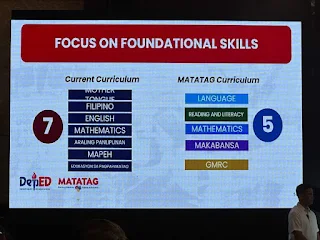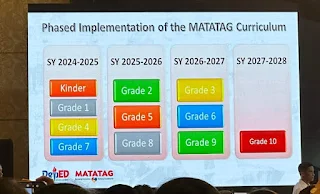DepEd Launches Visionary Matatag Curriculum for K to 10, Igniting a New Era of Education Starting SY 2024-2025
DepEd Introduces "Matatag" Curriculum: A Promising Paradigm Shift in Philippine Education
In a bold move towards educational reform, the Department of Education (DepEd) has unveiled the much-anticipated "Matatag" curriculum, marking a significant step in reshaping the landscape of basic education in the Philippines. The curriculum revamp, set to roll out in phases beginning in the School Year (SY) 2024-2025, aims to prioritize essential skills and streamline learning to meet modern demands while upholding traditional Filipino values.
At the national launch event, Director Jocelyn D.R. Andaya, representing DepEd’s Bureau of Curriculum Development, emphasized the transformative potential of the Matatag curriculum. She highlighted its core focus on five foundational skills: language, reading and literacy, mathematics, makabansa, and good manners and right conduct. This pivotal shift from the existing seven areas of learning is expected to streamline education and hone in on the most vital aspects of knowledge acquisition.
Central to the curriculum overhaul is a substantial reduction in curriculum content, amounting to a remarkable 70%. This strategic move aims to alleviate the issue of overcrowding and enable educators to dedicate more time and resources to honing critical skills such as literacy and numeracy. By embracing a more concentrated approach, the Matatag curriculum is poised to equip students with a solid foundation for future learning and success.
The phased implementation of the Matatag curriculum is a carefully planned endeavor.
The Matatag curriculum will be integrated in stages:
- SY 2024 to 2025: Kinder, Grade 1, Grade 4, Grade 7
- SY 2025 to 2026: Grade 2, Grade 5, Grade 8
- SY 2026 to 2027: Grade 3, Grade 6, Grade 9
- SY 2027 to 2028: Grade 10
The curriculum will be introduced in stages, beginning with SY 2024-2025 for Kinder, Grade 1, Grade 4, and Grade 7. Subsequent years will see the integration of the curriculum for other grade levels, with the full incorporation of the curriculum into the K to 12 program expected by the end of 2028. This staged approach allows for a gradual transition, ensuring that both educators and students can adapt effectively to the new framework.
A testament to the thoroughness of the curriculum's development is the extensive public review process it underwent. The DepEd sought input from various stakeholders, including students, teachers, school proprietors, governmental entities, private sectors, and NGOs. An overwhelming 96% of the 4,843 respondents endorsed the new curriculum structure, signaling a collective vote of confidence in its potential to elevate the quality of education in the country.
As the Matatag curriculum paves the way for a new era of education in the Philippines, the DepEd remains hopeful that this innovative approach will strike a harmonious balance between modern educational requirements and the preservation of core Filipino values. With its focus on essential skills and a streamlined learning experience, the Matatag curriculum holds the promise of equipping the next generation with the tools they need to succeed in an ever-evolving world, while staying rooted in the rich tapestry of Philippine heritage.










No comments